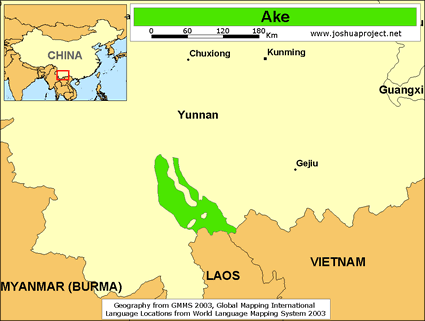The Akeu view themselves as a completely separate ethnic group from the Akha, even though research has shown they are historically related. Indeed, the genealogy of the Akeu is identical to that of the Akha. In China, the Akeu despise being called Akha, and claim they have nothing in common with them. It appears the Akeu may have suffered some great torment or discrimination at the hands of the Akha in the past, resulting in their present separation. The Akeu language is part of the Bi-Ka branch of Tibeto-Burman, related to Kado, Enu and Biyo in China. Their language is distinct from other varieties of Akha.
Akeu people live in two areas of the Gnot-Ou District within Phongsali Province of northern Laos. The Akeu also live in four villages within Menghai and Jinghong counties in southern China (not far from Laos), and in northern Myanmar. A few also live in northern Thailand.
The Akeu live in a very isolated world. Until recently they kept records and reminders by carving notches on wood, tying knots on rope, or by counting beans. Weddings are only permitted to take place among the Akeu between January and April each year.
The Akeu have practiced slash-and-burn agriculture for countless generations. Because of this, they are semi-nomadic, usually living in one place no more than four years before they pack up their belongings and look for new land.
The main religion of the Akeu could best be described an ancestor worship. They believe by honoring and worshiping their dead forefathers, that they can secure both a better existence for them in the next life and ensure that their own children will help them after they have died. As most ancestral rites are conducted by the oldest son, it is vital for a Akeu to have male children. If a woman is barren, or only has girls, a Akeu man is allowed a second wife.
The Akeu people need to find their way to the throne of grace. As it stands, it will be difficult for them to get the gospel resources they need.
Pray for the authority of Christ to bind hindering spiritual forces to lead them from darkness to light.
Pray for signs and wonders to happen among them and for great breakthroughs with a rapid multiplication of disciples and house churches.
Pray for bold workers who are driven by the love of the Holy Spirit to go to them.
Pray for an unstoppable movement to Christ among them.
Scripture Prayers for the Akeu in China.
Operation China, Asia Harvest, Copyrighted © Used with permission.
| Profile Source: Joshua Project |














